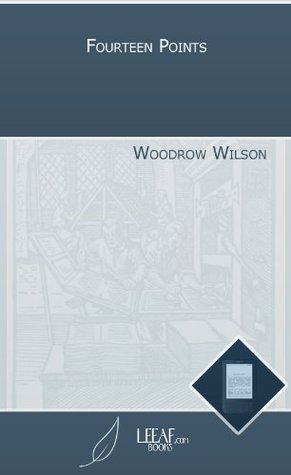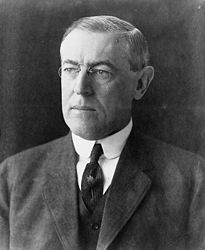
"(...) The Russian representatives presented not only a perfectly definite statement of the principles upon which they would be willing to conclude peace, but also an equally definite program of the concrete application of those principles. The representatives of the Central Powers, on their part, presented an outline of settlement which, if much less definite, seemed susceptible of liberal interpretation until their specific program of practical terms was added. That program proposed no concessions at all, either to the sovereignty of Russia or to the preferences of the populations with whose fortunes it dealt, but meant, in a word, that the Central Empires were to keep every foot of territory their armed forces had occupied—every province, every city, every point of vantage as a permanent addition to their territories and their power. It is a reasonable conjecture that the general principles of settlement which they at first suggested originated with the more liberal statesmen of Germany and Austria, the men who have begun to feel the force of their own peoples' thought and purpose, while the concrete terms of actual settlement came from the military leaders who have no thought but to keep what they have got. The negotiations have been broken off. The Russian representatives were sincere and in earnest. They cannot entertain such proposals of conquest and domination. The whole incident is full of significance. It is also full of perplexity. With whom are the Russian representatives dealing? For whom are the representatives of the Central Empires speaking? Are they speaking for the majorities of their respective parliaments or for the minority parties, that military and imperialistic minority which has so far dominated their whole policy and controlled the affairs of Turkey and of the Balkan States which have felt obliged to become their associates in this war? The Russian representatives have insisted, very justly, very wisely, and in the true spirit of modern democracy, that the conferences they have been holdin(...)".
Author

Thomas Woodrow Wilson (1856-1924) was the twenty-eighth President of the United States. A devout Presbyterian and leading intellectual of the Progressive Era, he served as President of Princeton University and then became the Governor of New Jersey in 1910. With Theodore Roosevelt and William Howard Taft dividing the Republican Party vote, Wilson was elected President as a Democrat in 1912. He proved highly successful in leading a Democratic Congress to pass major legislation that included the Federal Trade Commission, the Clayton Antitrust Act, the Underwood Tariff, the Federal Farm Loan Act and most notably the Federal Reserve System. Wilson was a proponent of segregation during his presidency. Narrowly re-elected in 1916, his second term centered on World War I. He tried to maintain U.S. neutrality, but when the German Empire began unrestricted submarine warfare he wrote several admonishing notes to Germany, and eventually asked Congress to declare war on the Central Powers. He focused on diplomacy and financial considerations, leaving the waging of the war primarily in the hands of the military establishment. On the home front he began the first effective draft in 1917, raised billions through Liberty loans, imposed an income tax, set up the War Industries Board, promoted labor union growth, supervised agriculture and food production through the Lever Act, took over control of the railroads, and suppressed anti-war movements. He paid surprisingly little attention to military affairs, but provided the funding and food supplies that helped the Americans in the war and hastened Allied victory in 1918. In the late stages of the war he took personal control of negotiations with Germany, especially with the Fourteen Points and the armistice. He went to Paris in 1919 to create the League of Nations and shape the Treaty of Versailles, with special attention on creating new nations out of defunct empires. Largely for his efforts to form the League, he was awarded the Nobel Peace Prize in 1919. Wilson collapsed with a debilitating stroke in 1919, as the home front saw massive strikes and race riots, and wartime prosperity turn into postwar depression. He refused to compromise with the Republicans who controlled Congress after 1918, effectively destroying any chance for ratification of the Versailles Treaty. The League of Nations was established anyway, but the U.S. never joined. Wilson's idealistic internationalism, calling for the U.S. to enter the world arena to fight for democracy, progressiveness, and liberalism, has been a highly controversial position in American foreign policy, serving as a model for "idealists" to emulate or "realists" to reject for the following century.